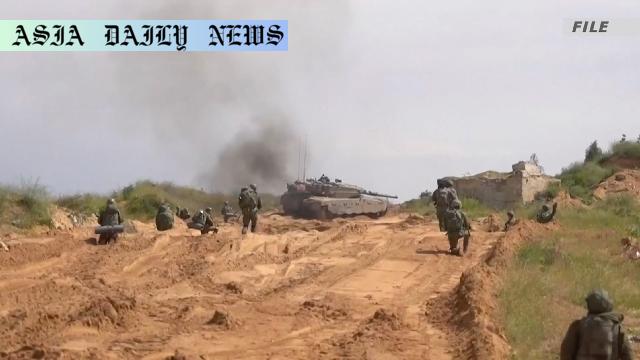Gaza Offensive: Nearly 800 people reported dead since Israeli forces resumed a large-scale operation amidst ongoing conflict.
The Gaza Strip has witnessed the loss of nearly 800 lives as a result of Israeli military operations resuming on March 18.
Increased attacks in areas like Jabalia have resulted in civilian casualties, including children and infants.
Israel’s parliament approved a record $30 billion defense budget, signaling possible further escalation.

Resurgence of Violence and Its Human Toll
In a continuation of the conflict between Israel and Gaza, renewed military operations since March 18 have resulted in the deaths of 792 people within a single week, devastating communities in the Palestinian enclave. Reports indicate that intensified Israeli strikes have been responsible for an alarming number of civilian casualties, including women, children, and infants caught amidst the hostilities. Gaza’s health authorities have described the past week as one of the deadliest periods in recent memory. Among the dead were victims in Jabalia, a northern Gaza locality, where a mother, her six-month-old baby, and several other children were killed overnight on Tuesday.
Ceasefire Stalemate Exacerbates Tragedy
The escalation follows the breakdown of ceasefire discussions, without any indications from either side of a resolution in sight. For Gaza’s civilian population, the repercussions of this breakdown have become glaringly evident. Schools, hospitals, and communities face severe damage amidst ongoing airstrikes and military confrontations, leaving families displaced and access to essential services sparse. Reports from Al Jazeera further shine a light on the vulnerability of Gaza residents, who continue to bear the brunt of the violence.
Increased Military Spending and Its Implications
Meanwhile, the Israeli government appears to be preparing for continued conflict, with the recent passage of its state budget for 2025. A record-high appropriation of $30 billion (110 billion shekels) toward defense reflects Israel’s strategic priorities within the context of its tensions with neighboring territories. Finance Minister Bezalel Smotrich has referred to the new budget as a “budget of war,” confidently adding that it represents a step toward “victory.” These remarks, evocative as they are, underscore the lack of optimism for imminent peace in the region.
Global Reactions and U.S. Support
On the international stage, the United States has continued to offer overt support for Israel. Mike Huckabee, nominee for the position of U.S. ambassador to Israel, voiced concerns about the consequences of a hypothetical Israeli defeat, stating to the Senate during his hearing that such an outcome could pave the way for challenges to the United States. Huckabee’s remarks illustrate the geopolitical entanglements of the conflict, suggesting that international allies remain deeply invested in the outcome of these hostilities in Gaza.
A Growing Concern for Humanitarian Aid
As violence intensifies, international humanitarian organizations have raised alarms about an impending crisis in Gaza. Access to food, water, medical aid, and shelter is becoming increasingly limited for civilians trapped in the territory. With infrastructure compromised by relentless bombing campaigns and no diplomatic solutions in sight, millions are left to grapple with unimaginable hardship, compounding their already dire living conditions under a blockade that severely restricts movement and resources. Calls from the international community for a ceasefire and resolution remain urgent but unanswered, highlighting how the human cost of political disputes continues to mount.
The Path Forward: Searching for Peace Amid Chaos
While both sides continue to launch attacks and defend their respective nation-states, the need for a balanced and sustainable diplomatic resolution has never been more apparent. The tragedy and despair in Gaza represent a longstanding conflict that requires international mediation and commitment to peacekeeping efforts. Without comprehensive action tailored toward peace, the region risks further destabilization, perpetuating endless cycles of violence with no end in sight.
Commentary
The Ever-Increasing Human Cost of Conflict
The escalating violence in Gaza is a tragic reminder of the devastating human cost of unresolved geopolitical tensions. When nearly 800 lives are claimed in a single week, it is impossible to ignore the harrowing reality faced by civilians who have no control over the political or military strategies that upend their lives. From children to newborn infants, the indiscriminate nature of such violence exposes the vulnerability of those caught in conflict zones. It is essential that the human suffering in Gaza becomes the focal point for dialogue, rather than merely a footnote in strategic calculations.
Diplomatic Stalemates: A Barrier to Peace
The absence of progress in ceasefire talks has undoubtedly exacerbated the current crisis. Political impasses, often rooted in deeply entrenched mistrust, have repeatedly obstructed opportunities for meaningful change in the region. Yet, we cannot underscore enough how critical it is to overcome these barriers. A genuine, equitable effort at reconciliation could unlock paths to peace, but such outcomes require global powers and stakeholders to actively prioritize dialogue over division.
The Global Community’s Role in Conflict Resolution
While Israel’s military strategy and increased defense budget highlight its resolve, the international community bears significant responsibility for either perpetuating or alleviating conflicts like this. External allies, including the United States, must tread a careful line—continuing support for an ally while advocating for measures that alleviate human suffering. Peaceful resolutions are unlikely if global narratives only bolster one party’s advantage while ignoring the plight of the other side. Instead, collaborative international efforts toward humanitarian assistance and crisis management could pave the way for lasting solutions.
Final Thoughts: Choosing Progress Over Violence
Ultimately, the Gaza offensive not only showcases the scale of destruction in the absence of active peace initiatives but also serves as a stark warning of what prolonged violence can bring. Civilians should never bear the brunt of political decisions, and the world’s collective empathy and action should reflect that basic principle. As observers, decision-makers, and ordinary global citizens, we must amplify calls for ceasefire, restoration, and reconciliation, ensuring that no more lives are needlessly lost to this conflict.


